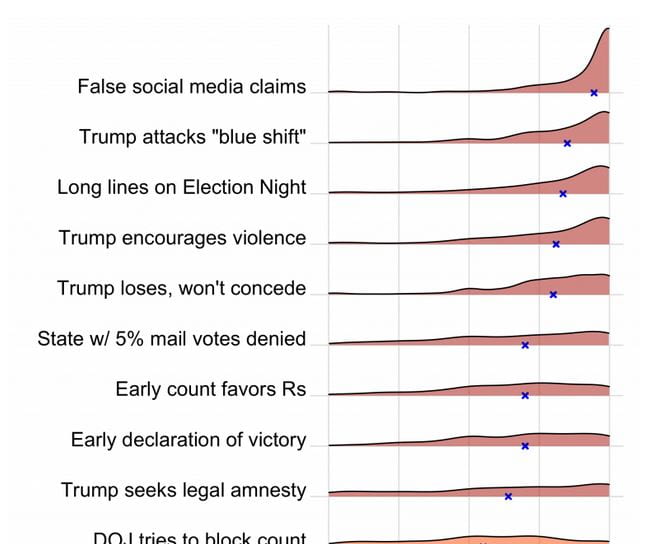Bright Line Watch, a multi-university initiative housed at CCD to monitor the state of U.S. democracy, has produced the results of its 12th survey wave, conducted from October 5-16, 2020. Political scientists and a subset of the American public assessed the quality of U.S. democracy overall and to rate performance on 30 distinct democratic principles. In addition, for this pre-election survey, we also asked our experts to rate the likelihood of 28 scenarios related to the November election that could produce political crises and asked our public sample questions about the legitimacy of different election results, their confidence votes will be counted fairly, their beliefs about voter fraud, and their willingness to tolerate political violence. Some of the key findings of this survey include:
- Our expert respondents anticipate a flood of online misinformation and potentially destabilizing rhetoric from President Trump during and after November 3. They also see substantial risks of other scenarios that could threaten the election, including potential dysfunction in the mechanics of casting and counting votes, the Electoral College, and the resolution of electoral disputes.
- Our experts rate President Trump’s statement that the 2020 election should be delayed and his refusal to commit to a peaceful transfer of power as the most important and abnormal of the 169 events they have rated over the course of his presidency.
- Citizens are generally confident their votes will be counted as intended at the local level and as voters intend in their states but somewhat less confident in the process at the national level.
- Only 44% of Trump supporters say they would regard a Biden victory as legitimate and only 34% of Trump opponents said they would view a Trump victory as legitimate.
- Both supporters and opponents of President Trump recognize that the election result may not be clear on November 3. Majorities of both groups say they are prepared to recognize outcomes that differ from the initial count on Election Night as legitimate.
- Trump’s supporters and opponents have starkly different beliefs about the prevalence of voter fraud in U.S. elections.
- Most Americans, regardless of political affiliation, reject the use of violence to advance political goals, but substantial minorities are willing to condone violence and incivility.
- Americans’ confidence that their government protects them from political violence and guarantees their right to peaceful protest have declined since March.
